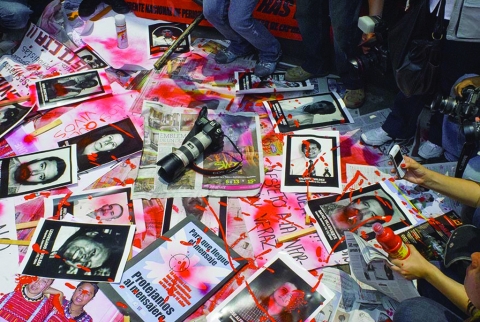
The violence that continues to rock Mexico has created a “zone of silence” where reporters have to choose between reporting and dying, or keeping quiet and surviving, said Jorge Luis Sierra, the International Center for Journalists’ (ICFJ's) Knight International Journalism Fellow focusing on digital security. Sierra spoke during a March 18 panel discussion on Capitol Hill organized by Freedom House and ICFJ.
Also on the panel: Raúl Benítez Manaut, President of the Colectivo de Análisis de la Seguridad con Democracia (CASEDE), and Carlos E. Ponce, Freedom House’s Director for Latin America and the Caribbean. Freedom House Vice President Robert Herman was the moderator.
Kicking off the discussion, Rep. Adam Schiff (D-CA), noted the dire situation for Mexican reporters and citizens who try to expose the truth. “Sadly, those who tell the story [including journalists] too often pay with their lives,” he said. Schiff has often spoken out about the impact the war on drugs has had on media and freedom of expression in Mexico.
Freedom House rated Mexico as the deadliest country in the Americas for journalists in 2014, with three journalists killed as a result of their work. Nearly 20 journalists have been kidnapped there since 2012.
All of the panelists agreed that the biggest challenge for the administration of President Enrique Peña Nieto is impunity. Ponce said Mexican authorities believe the best solution for investigative journalists is to get rid of them.
.@FreedomHouseDC's Bob Herman: Freedom of the Press cites Mexico as "not free" because of self-censorship & less variety in media ownership.
— ICFJ (@ICFJ) March 18, 2015
Herman asked if Mexico’s government can enact the structural reforms needed to address the violence that is tearing apart civil society. But Manaut wasn’t ready to give up on the Mexican officials. He noted, “There are many people inside government who are supportive of democracy. We need to find them and work with them.”
Sierra suggested closing “the gap between media organizations and human rights organizations. They need to work together” to change society.
.@latinointx of @ICFJKnight has been training journalists on how to avoid and lessen risk w/ the help of ICFJ and @FreedomHouseDC.
— ICFJ (@ICFJ) March 18, 2015
The panelists agreed that attacks on civilians and journalists in Mexico by drug traffickers and corrupt officials also have an impact on U.S. journalists working in Mexico, inhibiting their ability to report. Some have been forced to leave the country. The panelists said there should be bilateral dialogue on ways to eliminate that “zone of silence” that helps criminals and corrupt officials to operate with impunity.
@FreedomHouseDC's Robert Herman; We have a list of recommendations, I.e., having a hearing focused on targeting of journos. @ICFJ
— Elisa Tinsley (@elisatin) March 18, 2015
At the end of the session, Robert Herman mentioned recommendations for improving journalists' safety in Mexico prepared by Freedom House Trustee Diana Villiers Negroponte:
- Journalists in Mexico [should] recognize their need to become more professional.
- The federal government, in respecting its constitutional reforms and international obligations, must defend journalists as citizens and protectors against the abuse of power.
- Journalists must support one another. They should increase collaboration with professional associations and civil society to provide technical assistance on how to confront the major obstacles facing their profession.
Related content: Periodistas en Riesgo Site Provides Safety Resources for Mexican Reporters
Photo: CC-Licensed, thanks to Knight Foundation on Flickr.